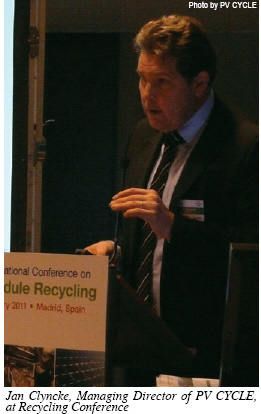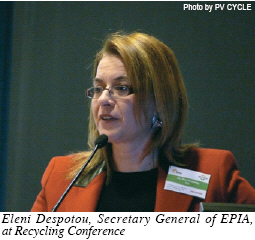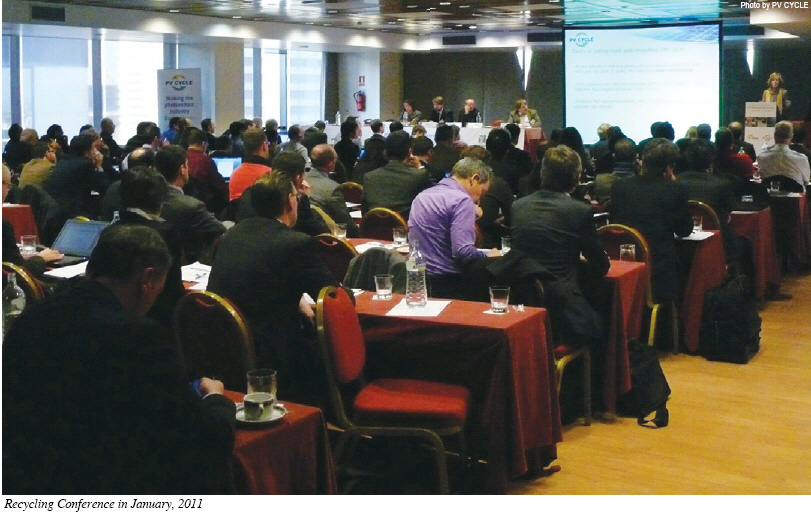By Jan Clyncke
 2010 was a year of expansion and growth for PV CYCLE, the voluntary take-back and recycling scheme for photovoltaic (PV) modules in Europe. Despite the latest political developments that may pose new obstacles for the PV industry, the commitment of our members remained strong and we hope this will continue in the near future. 2010 was a year of expansion and growth for PV CYCLE, the voluntary take-back and recycling scheme for photovoltaic (PV) modules in Europe. Despite the latest political developments that may pose new obstacles for the PV industry, the commitment of our members remained strong and we hope this will continue in the near future.
Last year was one of many firsts: the first containers were delivered, the first modules were collected and taken to a recycling plant, collection points were established in several countries and many new members joined. We are optimistic about what the new year will bring us and hope it will serve to consolidate all the work done since PV CYCLE was launched in 2007.
Facts and Figures
In concrete numbers, PV CYCLE ended 2010 with a total of 124 members representing over 90% of the whole PV market in Europe. 108 of them are full members--manufacturers and importers--and 16 are associate members--including research centers, associations and installers. It is worth highlighting that out of those 124 members, 77 of them joined last year alone. At the beginning of 2011, we already had 42 requests to become member of PV CYCLE.
Regarding our take-back scheme, today it is composed of almost 90 certified collection points spread across different countries: Germany, France, Italy, Spain, Belgium, UK, Portugal, Greece and the Netherlands. In certain cases, such as Germany, France and Italy, the response has been so positive that we have been able to cover almost the whole territory in a very short space of time and we continue building a dense enough network in all European countries.
Long-Lasting Installations
So far, almost 80 tons of end-of-life PV modules have been collected with more planned for immediate handling. This number is obviously far from the 6,000 tons that, based on early analysis, we predicted, were going to be disposed of in 2010 across Europe.
This discrepancy in numbers is actually very positive news for the industry and the technologies being used. The first significant installations of PV took place in the early 1990s and therefore, it is expected that an increasing number of modules will reach their end-of-life in the coming years. However, it is becoming evident that a lot of uncertainties surround the definition of what constitutes an end-of-life or end-of-use PV module, including factors such as the decision and behavior of the end user/owner, the existing national feed-in tariff mechanisms and many others.
Thanks to the work done through PV CYCLE, our members have anticipated the future need for an adequate disposal and recycling system for the modules they put on the market. It is this forward-thinking that characterizes such a young industry as this, which is truly committed to the concept of producer responsibility and putting in place the necessary system to reduce the environmental impact of their products.
Environmental Agreement
 Proof of this commitment is the Environmental Agreement signed by close to 85% of PV CYCLE’s members and presented to the European Commission which is now in the process of reviewing it. If the commission regards this voluntary agreement as valid, it will then be sent to the European Parliament and EU Member States for recognition, something which could happen in the first half of this year. Proof of this commitment is the Environmental Agreement signed by close to 85% of PV CYCLE’s members and presented to the European Commission which is now in the process of reviewing it. If the commission regards this voluntary agreement as valid, it will then be sent to the European Parliament and EU Member States for recognition, something which could happen in the first half of this year.
In this Environmental Agreement, signatories agree to set up a network of collection points. The system is free of charge for the end user, with a recycling target set at 85% of recycled materials out of all modules collected by the year 2015.
Apart from the fact that it was supported by close to 85% of our members, it is important to note that this agreement goes further than just collection and recycling. It includes the promotion of public awareness about how to adequately dispose of end-of-life PV modules as well as the development of end markets for recycled and recovered materials. A Monitoring Committee with representatives from PV CYCLE’s members, civil society and environmental NGOs will be set up to supervise our operations and make sure the targets are met.

The Year Ahead
We have great plans for 2011. To kick-off what we hope is going to be a promising year, in January we organized the ‘2nd International Conference on Phototovoltaic Module Recycling’ in Madrid in collaboration with the European Photovoltaic Industry Association (EPIA) and the institutional support of the European Commission’s Joint Research Centre (JRC) and the International Energy Agency PVPS Taskforce 12. Close to 200 participants had the opportunity to hear about the benefits of module recycling and recent technology development as well as all aspects related to its financial viability and ways to stimulate cost reduction by increasing end-of-life collection.
It was very gratifying to see how the PV sector is coming together strongly to take full responsibility for its products and subsequently learn from related sectors and the experiences in other countries such as India and Japan. At the same time, that the take-back and recycling schemes of PV CYCLE is consolidating across Europe, technology is maturing quickly so we are confident many more key developments will come in the near future. We must continue to work together to maximize efficiency and speed to make module collection and recycling a reality. Right here, right now.
Jan Clyncke is a law graduate from the University of Ghent with extensive experience setting up voluntary and mandatory waste takeback schemes in Belgium and the Netherlands. Prior to joining PV CYCLE (www.pvcycle.org) in 2008, he worked for the Dutch AVR-Van Gansewinkel Group.
For more information, please send your e-mails to pved@infothe.com.
ⓒ2010 www.interpv.net All rights reserved. |



